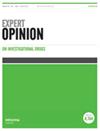白细胞介素拮抗剂治疗特应性皮炎:治疗新时代。
IF 4.9
2区 医学
Q1 PHARMACOLOGY & PHARMACY
引用次数: 0
摘要
简介:在过去十年中,人们对特应性皮炎(AD)免疫发病机制的认识不断加深,从而发现了多个治疗靶点,并随后开发出了新型、高效的全身治疗方法,包括白细胞介素(IL)拮抗剂。迄今为止,IL-4Ra抑制剂dupilumab和IL-13抑制剂tralokinumab已获得欧洲监管机构的批准,用于治疗中度至重度AD,同时还有70多种新疗法正在开发中。专家观点目前的数据表明,IL-4 和 IL-13 抑制剂对治疗中度至重度 AD 既有效又安全,可快速控制病情发作并使病情长期缓解。有关其他IL抑制剂(包括针对IL-31、IL-22、IL-33、IL-36和IL-18的抑制剂)疗效和安全性的数据正在不断积累。对于目前和未来治疗AD的药物,仍然需要进行真实世界证据研究和头对头研究。在具有如此大的异质性的疾病中建立治疗反应的预测性生物标志物可能有助于医生寻求适合患者的治疗反应。本文章由计算机程序翻译,如有差异,请以英文原文为准。
Interleukin antagonists for atopic dermatitis: a new era of therapy.
INTRODUCTION
Over the last decade, increasing understanding of the immunopathogenesis of atopic dermatitis (AD) enabled the recognition of multiple therapeutic targets and subsequently the development of novel, highly effective systemic treatments, including interleukin (IL)-antagonists. To date, the IL-4Ra-inhibitor dupilumab, and the IL-13 inhibitor tralokinumab, have gained regulatory approval in Europe for the treatment of moderate-to-severe AD, while more than 70 new therapeutics are currently in development.
AREAS COVERED
In this review, we address the role of ILs in the pathogenesis of AD and provide an overview of the novel and investigational IL-antagonists, as regards their efficacy and safety on moderate-to-severe AD.
EXPERT OPINION
Current data have established IL-4 and IL-13 inhibitors as effective and safe for the treatment of moderate-to-severe AD, as regards the rapid control of flares as well as the long-term remission of the disease. Data regarding the efficacy and safety of other IL-inhibitors, including those targeting IL-31, IL-22, IL-33, IL-36 and IL-18, are accumulating. There is still an unmet need for real-world-evidence studies and head-to-head studies for both currently available and future agents in AD treatment. Establishing predictive biomarkers of treatment response in a disorder of such considerable heterogenicity might help physicians pursue a patient-tailored therapeutic response.
求助全文
通过发布文献求助,成功后即可免费获取论文全文。
去求助
来源期刊
CiteScore
10.00
自引率
0.00%
发文量
71
审稿时长
6-12 weeks
期刊介绍:
Expert Opinion on Investigational Drugs (ISSN 1354-3784 [print], 1744-7658 [electronic]) is a MEDLINE-indexed, peer-reviewed, international journal publishing review articles and original papers on drugs in preclinical and early stage clinical development, providing expert opinion on the scope for future development.
The Editors welcome:
Reviews covering preclinical through to Phase II data on drugs or drug classes for specific indications, and their potential impact on future treatment strategies
Drug Evaluations reviewing the clinical and pharmacological data on a particular drug
Original Research papers reporting the results of clinical investigations on agents that are in Phase I and II clinical trials
The audience consists of scientists, managers and decision-makers in the pharmaceutical industry, and others closely involved in R&D.

 求助内容:
求助内容: 应助结果提醒方式:
应助结果提醒方式:


